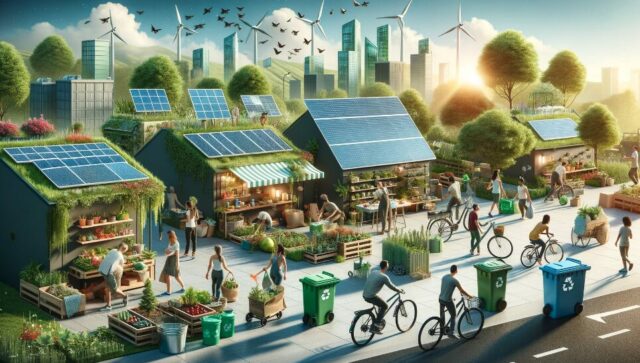Climate change is one of the most pressing issues of our time, and individual actions can make a significant difference in combating it. Sustainable living involves making choices that reduce your environmental impact, and surprisingly, even your online activities can contribute to this effort. This article provides actionable advice on how to live more sustainably, including tips on reducing waste, conserving energy, and making eco-friendly choices.
Understanding Your Carbon Footprint
Your carbon footprint is the total amount of greenhouse gases, primarily carbon dioxide that you emit directly or indirectly through your activities. Understanding your carbon footprint is the first step toward reducing it. There are various online tools and calculators available that can help you measure your personal carbon footprint, providing insights into areas where you can make improvements.
Energy Conservation at Home
Reducing energy consumption at home is one of the most effective ways to lower your carbon footprint. Here are some practical tips:
Switch to LED Bulbs: LED bulbs use up to 80% less energy than traditional incandescent bulbs.
Unplug Devices: Unplug electronics when not in use to prevent energy waste from standby power.
Smart Thermostats: Install a smart thermostat to optimize heating and cooling, reducing energy usage.
Sustainable Transportation
Transportation is a significant contributor to carbon emissions. Consider these alternatives:
Public Transport: Use buses, trains, or trams instead of personal vehicles.
Carpooling: Share rides with others to reduce the number of vehicles on the road.
Cycling and Walking: Opt for biking or walking for short distances.
Waste Reduction and Recycling
Reducing waste and recycling properly can significantly lower your environmental impact:
Reusable Bags and Containers: Use reusable shopping bags, water bottles, and food containers.
Composting: Compost organic waste to reduce landfill contributions and create nutrient-rich soil.
Recycling: Follow local recycling guidelines to ensure materials are properly processed.
Sustainable Food Choices
Your diet can also impact your carbon footprint:
Plant-Based Diets: Incorporate more plant-based meals into your diet to reduce the environmental impact of meat production.
Reduce Food Waste: Plan meals, store food properly, and use leftovers to minimize waste.
Local and Seasonal Produce: Choose locally grown and seasonal fruits and vegetables to reduce transportation emissions.
Eco-Friendly Shopping Habits
Make sustainable choices when shopping:
Sustainable Products: Look for products made from recycled or eco-friendly materials.
Minimal Packaging: Choose items with minimal or recyclable packaging.
Second-Hand Goods: Buy second-hand clothing, furniture, and electronics to reduce demand for new products.
Water Conservation
Conserving water is crucial for sustainability:
Fix Leaks: Repair leaking faucets and pipes to prevent water waste.
Low-Flow Fixtures: Install low-flow showerheads and faucets to reduce water usage.
Efficient Landscaping: Use drought-resistant plants and efficient irrigation systems in your garden.
Green Leisure Activities
Even your leisure activities can be eco-friendly:
Outdoor Activities: Enjoy hiking, biking, and other outdoor activities that have minimal environmental impact.
Sustainable Travel: Choose eco-friendly travel options, such as trains over planes, and stay in eco-friendly accommodations.
Digital Sustainability: The Case of French Online Casinos
The digital world also has a carbon footprint, and French online casinos are taking steps to reduce their impact:
Energy-Efficient Data Centers: Many French online casinos are investing in energy-efficient data centers that use less power and incorporate renewable energy sources.
Green Web Hosting: Some online casinos are switching to green web hosting services that offset carbon emissions through renewable energy credits.
Responsible Gaming: By promoting responsible gaming, online casinos can reduce excessive energy use associated with prolonged gaming sessions.
Compared to traditional brick-and-mortar casinos, which require significant energy for lighting, heating, cooling, and operations, online casinos can be more environmentally friendly. Players can further reduce their digital carbon footprint by choosing online casinos like these that prioritize sustainability.
Community Involvement and Advocacy
Join local environmental groups and support policies that promote sustainability:
Local Groups: Participate in community clean-ups, tree planting, and other environmental activities.
Advocacy: Support policies and initiatives that aim to reduce carbon emissions and promote renewable energy.
Measuring and Tracking Progress
Monitoring your progress is essential for long-term sustainability:
Carbon Footprint Trackers: Use apps and tools to track your carbon footprint over time.
Set Goals: Establish achievable sustainability goals and celebrate milestones.
Conclusion
Reducing your carbon footprint requires conscious effort and a commitment to sustainable living. By implementing these practical tips, from conserving energy, using a carbon footprint calculator, and reducing waste to making eco-friendly choices and supporting sustainable online activities like those of French online casinos, you can make a significant impact. Start your journey toward a greener future today, and inspire others to do the same. This article provides a comprehensive guide to sustainable living, offering practical tips across various aspects of daily life, including the unique angle of French online casinos’ sustainability efforts.





